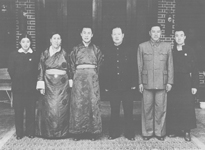Lobsang Samten Taklha
Lobsang Samten Taklha | |
|---|---|
 1955 picture of Lobsang Samden (far-right) with his family | |
| Born | 1933 Taktser, Qinghai, China |
| Died | 28 September 1985 (aged 51–52) Delhi, India |
| Spouse | Namgyal Lhamo Taklha |
| Mother | Diki Tsering |
Lobsang Samten Taklha (1933 – 28 September 1985) was a Tibetan politician and one of three elder brothers of the 14th Dalai Lama. In 1978 he helped found and eventually became the director of the Tibetan Medical Institute in Dharamsala, India, where the Dalai Lama still lives in exile.[1][2]
Biography
[edit]Lobsang Samten Taklha was born in Taktser, in northeastern Tibet, the same village where his brother, at the age of 4, was discovered by a council of elders and proclaimed the 14th Dalai Lama, the reincarnation of the religious and temporal leader of Tibet.
Samten's career took him from a position as chamberlain to his brother in Lhasa, the Tibetan capital, to refuge in the United States, where he made Tibetan crafts and, for a few years, worked as a custodian at the Scotch Plains-Fanwood High School in northern New Jersey.
In 1954, Samten traveled with the Dalai Lama to Peking, where over the course of several months they met with the Chinese leaders Mao Zedong and Zhou Enlai to discuss the Chinese presence in Tibet.
He left Lhasa for India in 1958, a year before an abortive uprising by Tibetans against Chinese rule that resulted in the Dalai Lama's flight on horseback over the Himalayas to India. He returned to Tibet once, in 1979, as a member of the first Tibetan fact-finding delegation sent there.
Samten, who served in the 1960's as his brother's representative in New Delhi and later in Geneva, died of hepatitis, according to Tenzin Tethong, the Dalai Lama's official representative in this country.
Samten died on 28 September 1985 at a hospital in New Delhi.
References
[edit]- ^ Kloos, Stephan (2008). "The History and Development of Tibetan Medicine in Exile". The Tibet Journal. 33 (3): 15–49. ISSN 0970-5368. JSTOR 43302651.
- ^ Backman, Michael (2004-04-05). The Asian Insider: Unconventional Wisdom for Asian Business. Springer. p. 210. ISBN 978-1-4039-4840-3.
- Heinrich Harrer, Seven Years in Tibet
- 14th Dalai Lama, Freedom in Exile
- Michael Harris Goodman, The Last Dalai Lama, Claire Lumière, 1993, ISBN 2905998261
- Mary Craig, Kundun
- Namgyal Lhamo Taklha, Born in Lhasa, 2001, Snow Lion Publications, ISBN 1-55939-102-2
